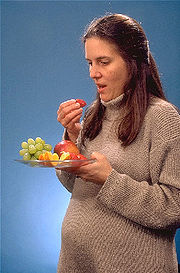A study published in the Pediatrics journal this month suggests that vitamin B12 may be an important nutrient in preventing neural tube defects (NTDs).
It has been known for some time that folic acid reduces the risk of having a baby with a NTD, and in New  Zealand it is recommended by the Ministry of Health that a folic acid supplement of 800µg per day is taken by women for four weeks before conception and twelve weeks afterwards (Ministry of Health, 2006).
Zealand it is recommended by the Ministry of Health that a folic acid supplement of 800µg per day is taken by women for four weeks before conception and twelve weeks afterwards (Ministry of Health, 2006).
This recent research suggests that it may also be wise to increase intakes of vitamin B12 during pregnancy (Molloy et al., 2009). The researchers assessed pregnancy vitamin B12 concentrations in blood samples taken at an average 15 weeks gestation from 3 groups of Irish women at a time when food fortification and supplementation were rare. Group 1 blood samples were from 95 women during a NTD affected pregnancy and 265 controls. Group 2 included blood samples from 107 women who had had a previous NTD birth, but whose current pregnancy was not affected, and 414 controls. Group 3 samples were from 76 women during an affected pregnancy and 222 control subjects.
Mothers of children affected by a NTD had a significantly lower B12 status. In all three groups, those in the lowest quartiles, compared with the highest, had between two and three fold higher adjusted odds ratio for being the mother of a child affected by a NTD. Pregnancy blood B12 concentrations of <250 ng/l were associated with the highest risk. Ideally women should have a vitamin B12 status of > 300 ng/l before becoming pregnant.
Vitamin B12 is only found naturally in foods of animal origin, and as such vegan women in particular may be at risk of poor intakes. Good sources of vitamin B12 include meat, fish, milk and dairy products.
Vegan women are advised to supplement their diet with vitamin B12 throughout pregnancy and during lactation in sufficient amounts to ensure adequate supplies for themselves and their child (NHMRC, 2006). This new research by Molloy and colleagues confirms the importance of this advice.
Having a good intake of nutrients is very important during pregnancy. For general information on healthy eating during pregnancy see the New Zealand Dietetic Association Fact Sheet on Nutrition during pregnancy.
Anyone concerned about their nutritional intake during pregnancy should seek advice from their LMC or from a registered dietitian.
To speak to an expert on nutrition and pregnancy, contact the Science Media Centre on 04 499 5476.
References
Ministry of Health. Food and Nutrition Guidelines for Healthy Pregnant and Breastfeeding Women: A Background Paper. Wellington: Ministry of Health, 2006.
Molloy AM, Kirke PN, Troendle, JF, et al. Maternal Vitamin B12 Status and Risk of Neural Tube Defects in a Population With High Neural Tube Defect Prevalence and No Folic Acid Fortification. Pediatrics, 2009; 123 (3): 917-923
National Health and Medical Research Council (NHMRC). Nutrient Reference Values for Australia and New Zealand including Recommended Dietary Intakes. Canberra: NHMRC, Wellington: Ministry of Health, 2006.